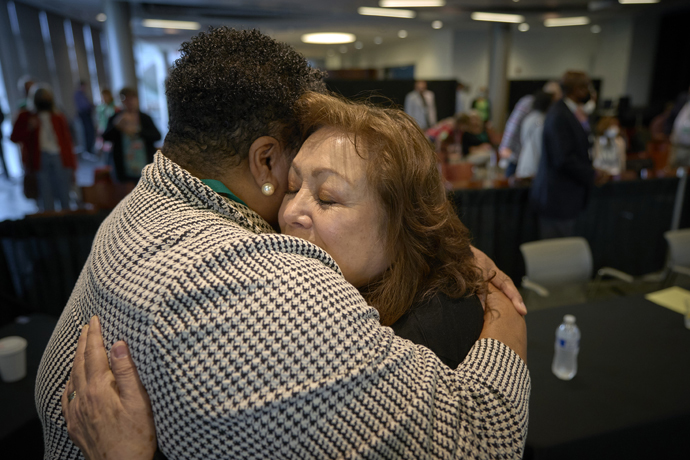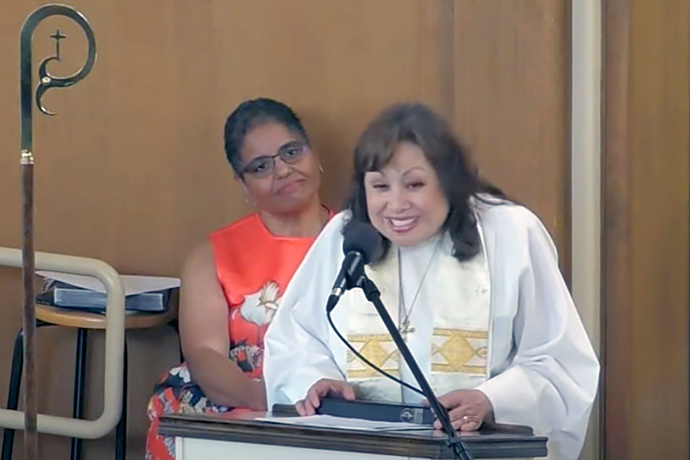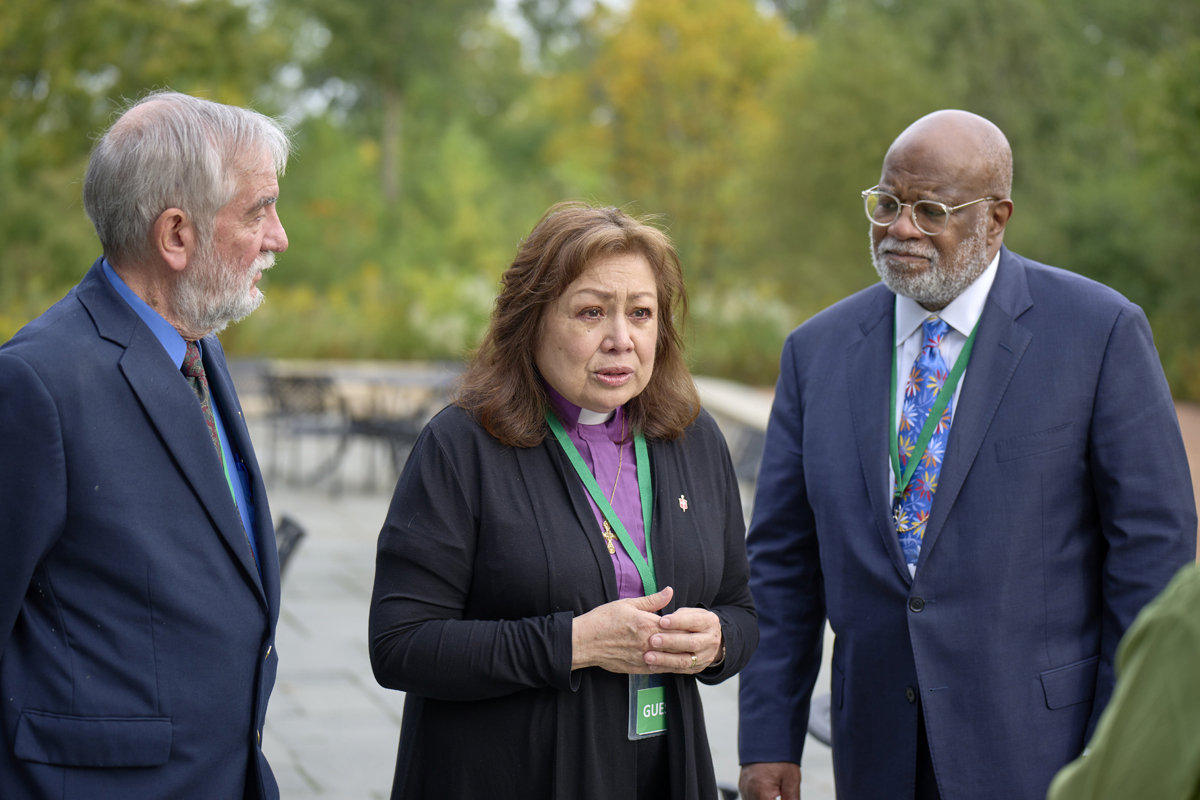Key Points:
- After being found not guilty of violating church law, United Methodist Bishop Minerva G. Carcaño has returned to leading the California-Nevada Conference.
- But questions remain about what comes next and how to avoid church trials in the future.
- One observer of the case suggests that the bishop and conference may need a third party to help them move forward together.
Bishop Minerva G. Carcaño said she worried about coming back to lead the California-Nevada Conference after her 18-month suspension and subsequent acquittal at a church trial.
“As I prepared to travel home to you, I kept asking myself: How would I return to you? How do you do that?” she told more than 300 people gathered Oct. 1 at First United Methodist Church in Sacramento, California. “I’ve never been through this before.”
No other United Methodist bishop or conference has been through this situation before.
Carcaño was delivering the sermon at a “Welcome Home” communion service — the first time she had preached in 18 months and a little over a week since a jury of 13 United Methodist clergy unanimously found her not guilty of violating church law.
She is the first bishop in The United Methodist Church and its predecessors to undergo a church trial in nearly 100 years. She also is the only bishop to be found not guilty and reinstated.

With her acquittal, Carcaño has been restored to her leadership role and seen the end of what she described as her “banishment” from her beloved United Methodist family.
But questions remain about what comes next for the denomination’s first Latina bishop and the conference she leads — including the people who filed the complaints that led to the trial and those who testified on their behalf.
Leaders across the denomination also are looking at how to avoid such ordeals for all involved in the future.
An earlier bishop’s trial
Church trials are expensive with costs for accommodations of the jury and other participants in the case as well as any legal help. The price tag could easily exceed $100,000. The costs for this trial, which also was the first one to be livestreamed, are still being calculated.
“We believe The UMC should take the time to learn from the process of a church trial,” said Becky Posey Williams and the Rev. Denise Smartt Sears in a joint email to United Methodist News. The two executives with the Commission on the Status and Role of Women were among those invited to observe the trial and monitor its fairness.
“Too often, it seems we ‘close the case’ and do not take advantage of processing, questioning and learning from our experiences,” they said.
The Book of Discipline, the denomination’s law book, calls church trials “an expedient of last resort” and encourages those involved to agree to a just resolution before a complaint ever gets to that point. But despite multiple attempts, no such resolution could be reached in this case.
The trial went forward Sept. 19-22 at the Glenview, Illinois, offices of Wespath Benefits and Investments, the denomination’s pension agency.
The four charges Carcaño faced stemmed from three complaints filed by members of the California-Nevada Conference, which she has led since 2016. The complaints dealt with three different disputes, but they all shared accusations that the bishop had breached her authority and retaliated against critics.
Ultimately, the jury decided that they had not seen clear and convincing evidence that Carcaño had exceeded the powers of United Methodist bishops.
The Rev. Kiboko Kiboko, one of those jurors, told United Methodist News after the trial that he did not think the jurors were all of the same mind when they began their deliberations.
“We came into this from different places culturally, theologically, spirituality and sociologically,” he said. “However, we were able to work nicely with each other to be able to finish the work with the same mind. That was the work of the Holy Spirit.”
The four complainants who testified during the trial — Diane Knudsen and the Revs. Jorge Dominges, Kristin Stoneking and Chelsea Constant — declined to talk to United Methodist News for this story. Others who testified at the trial declined or did not respond to requests.
Carcaño also has not responded to requests from UM News to comment for this story.
However, during the recorded Oct. 1 service, she told those gathered that she, too, was wrestling with her own questions about her return.
“How would I love you all?” she said she asked herself. “Now the question was not, ‘Would I love you?’ because I do love you. But how would I express that in genuine, authentic, healing ways?”
Her remaining time in the conference is limited. Because of age limits for bishops, Carcaño is scheduled to retire next September when she will be 70.

On Oct. 12, the bishop announced changes to her cabinet, the district superintendents who advise her in appointing the conference’s clergy. The changes include naming the Rev. Blake Busick to serve as dean of the cabinet, a position previously held by the Rev. Shinya Goto, who testified during the church trial on behalf of one of the complainants in the case.
During Carcaño’s welcome home service, she said she is seeking God’s guidance and asked those gathered to join their prayers with hers so that brokenness would be healed.
Rachel Gipson, a licensed therapist, daughter of two United Methodist pastors and member of the California-Pacific Conference, has followed the proceedings closely. She cautioned in a widely shared Facebook post that in this situation, talk of healing might be counterproductive unless all involved have safety.
She told UM News that a third party with experience in navigating workplace conflict as well as race, gender, culture and power dynamics might help create that safe atmosphere for the bishop and the people she leads to move forward.
“I think the primary thing that everyone can do is keep paying attention,” she said. “Silence from those at the center of this trial does not mean that all is resolved and well. It would likely be meaningful for those navigating this difficult experience to know that they are not alone, and that the body of the church continues to witness.”
How did this develop?
No one questions that hurt and pain linger after a long suspension and trial that has divided many in the conference and wider United Methodist Church.
Subscribe to our
e-newsletter
The announcement of Carcaño’s suspension last year stunned many United Methodists.
Carcaño has served in ordained ministry for 47 years, including nearly two decades as one of the denomination’s more prominent episcopal leaders.
The Western Jurisdiction — which encompasses seven conferences, or regional bodies, in U.S. western states and territories — elected Carcaño as the denomination’s first Latina bishop in 2004. Throughout her ministry, she has earned respect for her passionate advocacy for immigrants and other marginalized people.
But after receiving the complaints in March 2022, Western Jurisdiction leaders had enough concerns about their seriousness and the risk of reprisal that they placed the bishop on leave while the complaints were under review. The jurisdiction’s leaders also announced that retired Bishop Sally Dyck would serve as interim bishop of the California-Nevada Conference.
The problem was that while Carcaño’s suspension was very public, the nature of the complaints against her remained undisclosed — in line with the Discipline’s call for confidentiality. That led to rumors, suspicions and speculation running wild on social media and elsewhere.
Also of concern was the length of the bishop’s suspension from United Methodist ministry, with a number of groups calling for her reinstatement and the restoration of her voice in leadership.
A suspension is not intended to be seen as punitive. While on leave, a bishop receives full pay and benefits, including being able to remain in the assigned episcopal residence.
However, the bishop’s suspension lasted long beyond the initial review. That was on the recommendation of the Western Jurisdiction’s committee on investigation — a body that holds a somewhat similar role to a grand jury in the civil court system.
The suspension also continued as the bishop appealed her case to the Judicial Council, the denomination’s equivalent of a supreme court. The Judicial Council declined to rule on the matter while the church judicial process was ongoing. However, four of the nine participants in the Judicial Council’s deliberations disagreed with the majority — saying that fair process had been violated and that the bishop should be restored to her office.
The first time the wider public knew what charges the bishop faced was the opening day of the church trial — moved to the North Central Jurisdiction at the bishop’s request. Those charges were disobedience to the order and discipline of the church, undermining the ministry of another clergy person, harassment and fiscal malfeasance. Ultimately, the jury unanimously found her not guilty of all 25 specifications cited to support those charges.
The trial process was rough for all involved. The testimony by those who supported the complaints as well as those defending the bishop included the recounting of usually very private discussions about employment evaluations and the bishop’s work in fixing pastoral appointments. Also contributing to the tension were the disruptions and isolation caused by the COVID-19 pandemic.
During the trial, both Carcaño and the Rev. Kristin Stoneking, one of the complainants, testified that they felt deep regret that the conference’s conflict had reached a trial.
That was a sentiment widely shared by those who observed the proceedings.
What now?
Retired Bishop Alfred W. Gwinn, the presiding officer or equivalent of a judge in the case, invited representatives from three United Methodist organizations to serve as monitors and ensure fairness.
In addition to the Status and Role of Women representatives, observers came from the Commission on Religion and Race and MARCHA (Methodists Associated Representing the Cause of Hispanic/Latino Americans), the denomination’s Hispanic and Latino caucus. Both MARCHA and Religion and Race had been among the groups calling for the end of Carcaño’s suspension.
Whatever misgivings they had ahead of the trial, the groups’ representatives agreed that the trial itself was fair. Gwinn regularly checked in with the observers as the trial progressed.
At the end of the proceedings, Gwinn urged everyone watching in person and online to find a better way for handling disputes than the church trial process. “We are not witnessing at all to a secular world in this process,” he said.
The observers took that to heart.
“One solution might involve finding a method that allows the complaint process to be evaluated outside the jurisdiction in which it originates,” said the Rev. Giovanni Arroyo, top executive of Religion and Race.
The Rev. Lyssette N. Perez, president of MARCHA and a United Methodist pastor in New Jersey, was troubled that the trial took place at all, especially during Hispanic/Latino Heritage Month.
The church should follow Jesus’ words in Matthew 18:15-17, she said. In that passage, Jesus instructs his disciples to first try to resolve a conflict one on one and then with one or two witnesses before bringing it to the whole church.
“This shows how we should deal with the hierarchy and how we should solve our conflicts,” Perez said. “We could be inspired by Jesus and ensure that all the leaders of our denomination are trained in conflict resolution.”
For her part, Carcaño based her Oct. 1 sermon on 1 Peter 2:1-10, which starts by calling Christians to rid themselves “of all malice and all guile, insincerity, envy, and all slander.”
She told those gathered that as she prays for the conference, she takes reassurance in God’s faithfulness and mercy.
“God will be with us as we … rejoin our arms around one another and rejoin our hands as a people of God,” she said. “Of this, we are sure.”
Hahn is assistant news editor for UM News. Contact her at (615) 742-5470 or newsdesk@umcom.org. To read more United Methodist news, subscribe to the free Daily or Friday Digests.




